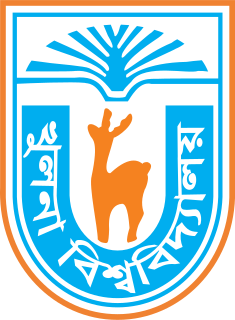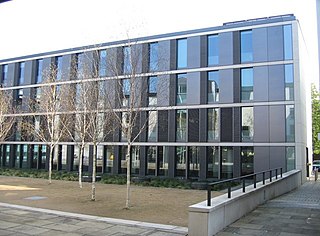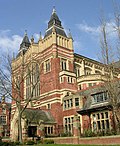
The London School of Economics and Political Science is a public research university located in London, England, and a constituent college of the federal University of London. Founded in 1895 by Fabian Society members Sidney Webb, Beatrice Webb, Graham Wallas, and George Bernard Shaw, LSE joined the University of London in 1900 and established its first degree courses under the auspices of the university in 1901. LSE began awarding its degrees in its own name in 2008, prior to which it awarded degrees of the University of London.

The Open University (OU) is a British public research university and the largest university in the United Kingdom by number of students. The majority of the OU's undergraduate students are based in the United Kingdom and principally study off-campus; many of its courses can also be studied anywhere in the world. There are also a number of full-time postgraduate research students based on the 48-hectare university campus in Milton Keynes, where they use the OU facilities for research, as well as more than 1,000 members of academic and research staff and over 2,500 administrative, operational and support staff.

The University of Leeds is a public research university in Leeds, West Yorkshire, England. It was established in 1874 as the Yorkshire College of Science. In 1884 it merged with the Leeds School of Medicine and was renamed Yorkshire College. It became part of the federal Victoria University in 1887, joining Owens College and University College Liverpool. In 1904 a royal charter was granted to the University of Leeds by King Edward VII.

Cochin University of Science and Technology (CUSAT) is a state government-owned autonomous university in Kochi, Kerala, India. It was founded in 1971 and has three campuses: one in Kalamassery Kochi, one in Ernakulam Town, and one in Kuttanad, Alappuzha, 66 km (41 mi) inland. The university awards degrees in engineering and science at the undergraduate, postgraduate and doctoral levels.

Khulna University is a public university in Gollamari, Khulna, Bangladesh. It is near the river Moyur, beside the Sher e Bangla Road. The academic programs of Khulna University started on 31 August 1991 with 80 students in four disciplines. As of November 2019, the university has 29 disciplines under six schools and two institutes. It is the only public university in Bangladesh where student politics is not allowed.

The University of the Highlands and Islands is a tertiary institution composed of academic partners, being 13 colleges and research institutions located in the Highlands and Islands of Scotland, that deliver further education and higher education. Its executive office is in the former Royal Northern Infirmary building in Inverness.

Keele University School of Medicine is a medical school located in Newcastle-under-Lyme and Shrewsbury. The first two years of the school's MBChB degree are mostly taught on the Keele University campus, while early contact to patients is critical, and there is significant interaction in a clinical environment from the second-year onwards.

The Institute of Criminology is the criminological research institute within the Faculty of Law at the University of Cambridge. The institute is one of the oldest criminological research institutes in Europe, and has exerted a strong influence on the development of criminology. Its multidisciplinary teaching and research staff are recruited from the disciplines of law, psychiatry, psychology, and sociology. It is located on the Sidgwick Site in the west of Cambridge, England. The Institute of Criminology building was designed by Allies and Morrison. The institute is also home to the Radzinowicz Library, which houses the most comprehensive criminology collection in the United Kingdom. The institute has approximately 50 PhD students, 30-40 M.Phil. students, and 200 M.St students. The institute also offers courses to Cambridge undergraduates, particularly in law, but also in human social and political sciences and in psychology and behavioural sciences.

Indian Institute of Technology Madras is a public technical university located in Chennai, Tamil Nadu, India. As one of the Indian Institutes of Technology (IITs), it is recognized as an Institute of National Importance and has been consistently rated as one of India's most prestigious universities. Founded in 1959 with technical and financial assistance from the former government of West Germany, it was the third IIT established by the Government of India. IIT Madras is ranked the top engineering institute in India by the Ministry of Education's National Institutional Ranking Framework since its inception in 2016.
Swansea Business School is a public research institution focusing on business studies and is situated in the city of Swansea, Wales, UK. It is based near the High Street at the Swansea Business Campus of the University of Wales Trinity St David and is part of the Faculty of Business and Management. It offers numerous undergraduate courses in Human Resources, Law, Accounting, Business and Finance, Business Management, Leadership, Marketing and Skills for the Workplace.

The Faculty of Human, Social, and Political Science at the University of Cambridge was created in 2011 out of a merger of the Faculty of Archaeology and Anthropology and the Faculty of Politics, Psychology, Sociology and International Studies. According to the Cambridge HSPS website: graduates pursue careers in "research, the Civil Service, journalism, management consultancy, museums, conservation and heritage management, national and international NGOs and development agencies, the Law, teaching, publishing, health management, and public relations."

The Faculty Of Education is one of the 5 faculties which make up the University of Strathclyde in Glasgow, Scotland. The Faculty itself is split up into the a number of Educational Departments which offer undergraduate and postgraduate courses.
The Centre for Deaf Studies was a department of the University of Bristol, England, in the field of deaf studies, which it defines as the study of the "language, community and culture of Deaf people". Established in 1978, the Centre claimed to be the first higher educational Institute in Europe "to concentrate solely on research and education that aims to benefit the Deaf community". The centre was at the forefront in establishing the disciplines of deaf studies and deafhood. It used British Sign Language (BSL), had a policy of bilingual communication in BSL and English, and employed a majority of deaf teaching staff.

The National Institute for Social Work Training was set up in 1961, following proposals put forward in the 1959 Eileen Younghusband report for an independent staff college for social work. Its initial funding was assured for ten years by the Nuffield Foundation and the Joseph Rowntree Memorial Trust. It was later renamed the National Institute for Social Work (NISW), with a governing body of some twenty-five members.
Sheffield University Management School is an AMBA, AACSB and EQUIS accredited business school at the University of Sheffield in Sheffield, England. It is one of 60 business schools in the world to have achieved triple accreditation.

The Institute of Continuing Education (ICE) is a department of the University of Cambridge dedicated to providing continuing education programmes which allow students to obtain University of Cambridge qualifications at undergraduate and postgraduate level. Its award-bearing programmes range from Undergraduate Certificates through to part-time Master's degrees. ICE is the oldest continuing education department in the United Kingdom.

Faculty of Education, University of Cambridge is the School of Education located in Cambridge, UK and was established in 2001. It is part of the school of humanities and social sciences at the University of Cambridge.
The School of Geography is part of the Faculty of Environment at The University of Leeds based in the UK.
The Cambridge Institute for Sustainability Leadership, formerly the Cambridge Programme for Sustainability Leadership and the Cambridge Programme for Industry, is part of the School of Technology within the University of Cambridge.

The University of OxfordFaculty of Law is the law school of the University of Oxford. It has a history of over 800 years in the teaching and learning of law. Oxford's law school is currently ranked first in the world in the 2019 Times Higher Education World University Rankings.
















